About RV Inverter Sizing
Understanding your power needs is crucial before you can select the correct size of RV electrical inverters. Your inverter is the heart of your RV’s electrical system. It transforms DC power from your batteries into AC power for your appliances. It also acts as a charger when plugged in at the campsite.
The first step with an RV inverter size calculator is to tally up the wattage of all devices you plan to run simultaneously. This includes everything from your microwave and coffee maker to smaller gadgets like your laptop or phone charger. Include everything that uses 110V power.
Imagine you’re brewing a cup of coffee while working on your laptop and watching TV. Your coffee maker might draw around 1000 watts, the TV about 200 watts, and your computer another 100 watts. Combined, that’s 1300 watts. Always add a buffer, so if your total usage comes to 1300 watts, you might consider a 2000-watt inverter to handle any unexpected surges.
Next, consider the type of inverter. Pure sine wave inverters offer smooth and consistent power for sensitive electronics. Modified sine wave inverters are cheaper but might not work well with all devices. It’s like choosing between a paved road and a gravel path—both will get you there, but the ride might be bumpier on one.
Finally, think about future-proofing. Your power needs might grow as you add new gadgets or upgrade your RV. Choosing an inverter with a higher capacity now can save you headaches later. So, whether you’re boondocking in the wilderness or parked at a scenic campground, having the right-sized inverter ensures you’ll have the power you need whenever you need it.
Use our RV Inverter Calculator
Welcome to our RV Inverter Size calculator, a free tool designed to help you estimate the size of the inverter you will need to supply the 110V power required by your RV and to keep your RV battery bank fully charged when you are plugged into shore power. This will ensure that you have a safe and reliable power supply for your coach’s RV electrical system.
To do that, calculate how much wattage your coach could use when plugged into shore power. Then, a conversion must translate that power consumption total to an inverter capacity with built-in headroom.
RV Inverter Size Calculator
Add the quantity of each appliance/load you expect to use simultaneously. I recommend that you input multiple combinations to find the highest potential power draw you could experience at any given point in time. This will allow you to make the best decision about sizing an inverter appropriate for your needs.
How to use the RV Inverter Size Calculator to Choose the Right Inverter
In the first part of the calculator, add every 110-volt appliance or other power draw you think you will need to power SIMULTANEOUSLY on board your motorhome or travel trailer.
The calculator will return the inverter watts required to power the 110V appliances from the coach’s 12-volt system.
Note: We have used wattage values slightly higher than the average for each load in this RV inverter size calculator. However, it would help if you double-checked each wattage rating on your appliances. I know this sounds like a lot of work, but having sufficient inverter power for your loads is essential to your safety. You want to avoid an undersized inverter, which can cause overheating and potentially a fire.
My Picks for the Best RV Power Inverters
Best Pure Sine Wave Inverter
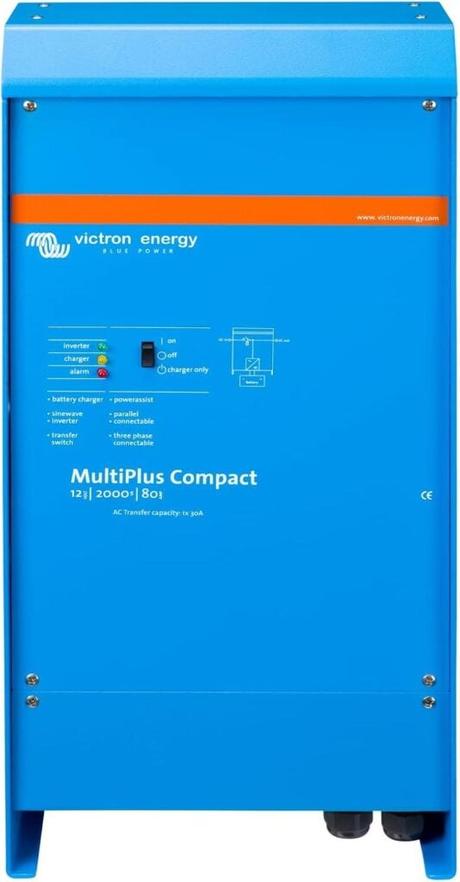
Victron Energy MultiPlus 2000VA
This reliable pure sine wave inverter provides clean power for sensitive electronics. The MultiPlus is known for its build quality and can be paralleled for increased power needs.
Best Modified Sine Wave Inverter
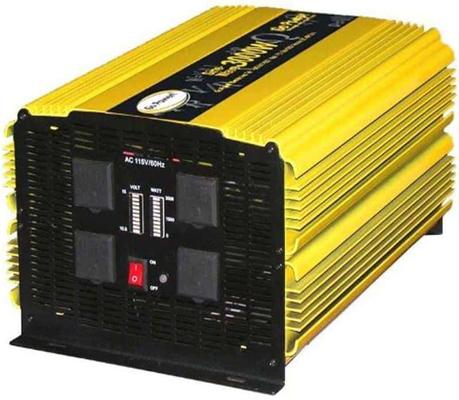
Go Power! GP-3000HD 3000-Watt Modified Sine Wave Inverter
Perfect for basic RV appliances, this modified sine wave inverter offers ample wattage and durability at an affordable price.
Best Inverter Charger Combo
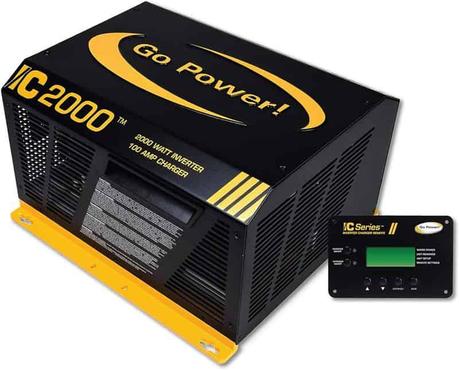
Go Power! IC-2000 2000-Watt Inverter Charger
This Go Power model is highly regarded for its durability and smooth pure sine wave power, along with fast and efficient battery charging capability.
Best Portable Power Inverter
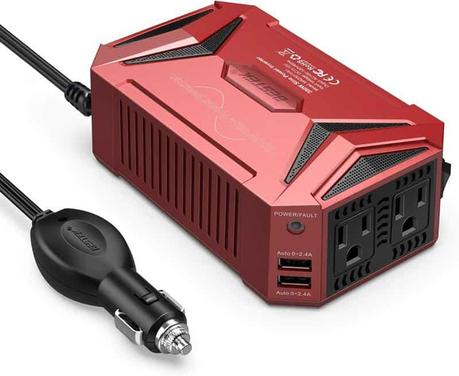
BESTEK 300W Power Inverter
This compact and versatile inverter is great for portable use, with 2 AC outlets and 2 USB ports, perfect for charging small devices on the go.
Best High-Wattage Inverter
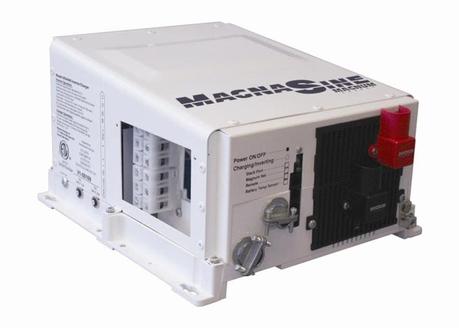
Magnum Energy MS2812 2800-Watt 12V Pure Sine Wave Inverter
This model is designed specifically for RVs and other off-grid systems that require a 12-volt supply. With a 2800-watt power output, it provides ample energy for running heavy-duty appliances like refrigerators, air conditioners, or microwaves. It’s reliable, offers pure sine wave power, and is known for its durability and high-quality performance in demanding RV applications.
Best Low-Wattage Inverter
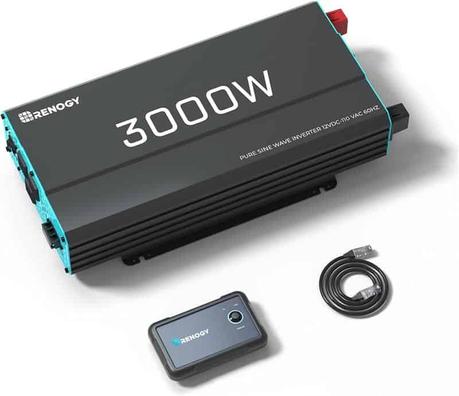
Renogy 300-Watt Pure Sine Wave Inverter
This inverter is perfect for light power needs in an RV. It’s compact, energy-efficient, and provides clean, stable pure sine wave power. The 300-watt output is ideal for running smaller appliances, charging phones, or powering LED lights. Renogy is known for its reliability, making this a solid choice for RVers looking to conserve battery life while still keeping their essential devices running smoothly.
For a complete list of recommendations for RV Power Inverters, see this article.
What are my Different Recommendation Groups?
Pure Sine Wave Inverters
Pure sine wave inverters are known for delivering clean and stable power that closely mimics the energy provided by utility companies. This smooth power is essential for sensitive electronics like laptops, TVs, medical devices, and other gadgets that require a consistent, reliable energy source. Pure sine wave inverters help prevent issues like overheating or device malfunction, making them a must-have for RVers who rely on modern electronics while on the road.
Modified Sine Wave Inverters
Modified sine wave inverters offer a more budget-friendly solution for powering basic appliances. While they don’t produce as smooth a current as pure sine wave models, they work well for less sensitive devices like power tools, lights, and small appliances. These inverters are ideal for RV owners who need an affordable way to run everyday equipment without worrying about damaging delicate electronics.
Inverter/Charger Combos
An inverter/charger combo provides dual functionality by not only inverting DC battery power into AC for your devices but also charging your RV batteries when connected to shore power or a generator. This all-in-one system simplifies power management, making it a popular choice for those who want a seamless switch between off-grid and shore power use. These devices ensure that your batteries stay charged while still delivering stable AC power to your appliances.
Portable Power Inverters
Portable power inverters are lightweight, compact, and designed for ease of use. Perfect for travelers who don’t want to deal with a permanent installation, they offer the flexibility to power small devices like phones, laptops, and cameras wherever you go. These inverters can be easily stored and pulled out when you need them, making them ideal for quick trips or situations where portability is key.
High-Wattage Inverters
High-wattage inverters are built to handle larger power loads, making them the go-to choice for running heavy-duty appliances like refrigerators, air conditioners, or microwaves. These inverters are designed for RVers with high power needs or those running multiple appliances simultaneously. They are essential for anyone looking to replicate the comforts of home in their RV, providing the energy needed to keep larger systems running smoothly.
Low-Wattage Inverters
Low-wattage inverters are efficient, compact, and ideal for powering smaller appliances or basic RV setups. These inverters are great for light power needs such as charging phones, running LED lights, or powering small fans. They consume less energy, making them a great option for conserving battery life while still keeping essential devices running.
After you determine the inverter size you need using the RV inverter size calculator, you’ll be able to determine what category of inverter will work best for you
RV Inverter FAQs
What can a 3000-watt inverter run in an RV?
A 3000-watt inverter can run various appliances in an RV, such as refrigerators, microwaves, a single air conditioner, TVs, and small power tools. However, you may not be able to run all of them simultaneously. To check the power draw for each configuration, you can enter multiple concurrent use scenarios into our RV inverter size calculator above.
How do I calculate the size of the inverter I need?
Calculate the inverter size needed by adding up the wattage of all the devices you plan to run simultaneously. The RV Inverter Size Calculator above makes it easy.
Will a 3000-watt inverter run a refrigerator?
Yes, a 3000-watt inverter should be able to run a 2-way or 3-way RV refrigerator in AC power mode. The electric heating elements in these fridges are generally less than 1000 watts. What’s more important is what other appliances you are planning on running at the same time. For example, running an air conditioner simultaneously with a 110-volt fridge may exceed the safe level for a 3000-watt inverter.
What Size Inverter Do I Need? – How to Choose the Right Size Inverter
